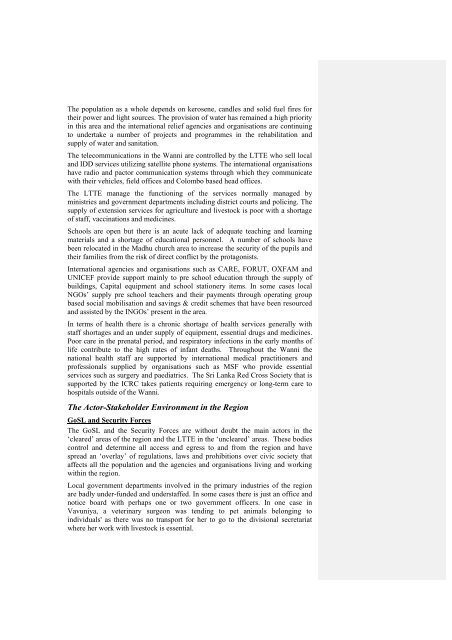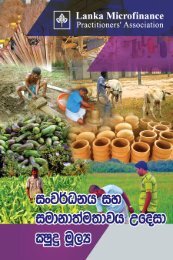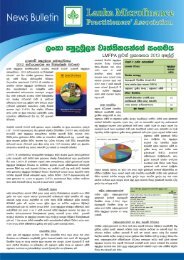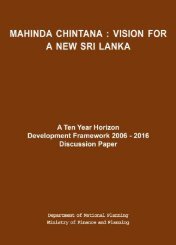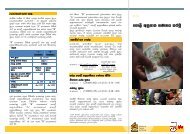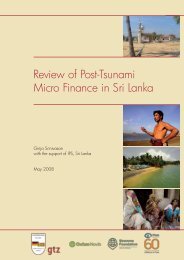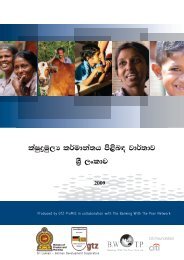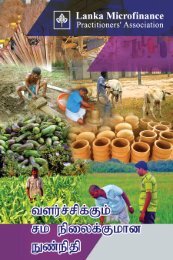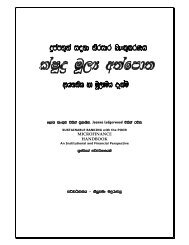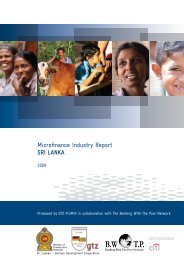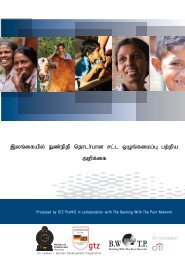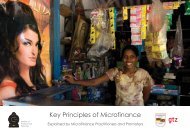National Microfinance Study of Sri Lanka: Survey of Practices and ...
National Microfinance Study of Sri Lanka: Survey of Practices and ...
National Microfinance Study of Sri Lanka: Survey of Practices and ...
Create successful ePaper yourself
Turn your PDF publications into a flip-book with our unique Google optimized e-Paper software.
The population as a whole depends on kerosene, c<strong>and</strong>les <strong>and</strong> solid fuel fires for<br />
their power <strong>and</strong> light sources. The provision <strong>of</strong> water has remained a high priority<br />
in this area <strong>and</strong> the international relief agencies <strong>and</strong> organisations are continuing<br />
to undertake a number <strong>of</strong> projects <strong>and</strong> programmes in the rehabilitation <strong>and</strong><br />
supply <strong>of</strong> water <strong>and</strong> sanitation.<br />
The telecommunications in the Wanni are controlled by the LTTE who sell local<br />
<strong>and</strong> IDD services utilizing satellite phone systems. The international organisations<br />
have radio <strong>and</strong> pactor communication systems through which they communicate<br />
with their vehicles, field <strong>of</strong>fices <strong>and</strong> Colombo based head <strong>of</strong>fices.<br />
The LTTE manage the functioning <strong>of</strong> the services normally managed by<br />
ministries <strong>and</strong> government departments including district courts <strong>and</strong> policing. The<br />
supply <strong>of</strong> extension services for agriculture <strong>and</strong> livestock is poor with a shortage<br />
<strong>of</strong> staff, vaccinations <strong>and</strong> medicines.<br />
Schools are open but there is an acute lack <strong>of</strong> adequate teaching <strong>and</strong> learning<br />
materials <strong>and</strong> a shortage <strong>of</strong> educational personnel. A number <strong>of</strong> schools have<br />
been relocated in the Madhu church area to increase the security <strong>of</strong> the pupils <strong>and</strong><br />
their families from the risk <strong>of</strong> direct conflict by the protagonists.<br />
International agencies <strong>and</strong> organisations such as CARE, FORUT, OXFAM <strong>and</strong><br />
UNICEF provide support mainly to pre school education through the supply <strong>of</strong><br />
buildings, Capital equipment <strong>and</strong> school stationery items. In some cases local<br />
NGOs’ supply pre school teachers <strong>and</strong> their payments through operating group<br />
based social mobilisation <strong>and</strong> savings & credit schemes that have been resourced<br />
<strong>and</strong> assisted by the INGOs’ present in the area.<br />
In terms <strong>of</strong> health there is a chronic shortage <strong>of</strong> health services generally with<br />
staff shortages <strong>and</strong> an under supply <strong>of</strong> equipment, essential drugs <strong>and</strong> medicines.<br />
Poor care in the prenatal period, <strong>and</strong> respiratory infections in the early months <strong>of</strong><br />
life contribute to the high rates <strong>of</strong> infant deaths. Throughout the Wanni the<br />
national health staff are supported by international medical practitioners <strong>and</strong><br />
pr<strong>of</strong>essionals supplied by organisations such as MSF who provide essential<br />
services such as surgery <strong>and</strong> paediatrics. The <strong>Sri</strong> <strong>Lanka</strong> Red Cross Society that is<br />
supported by the ICRC takes patients requiring emergency or long-term care to<br />
hospitals outside <strong>of</strong> the Wanni.<br />
The Actor-Stakeholder Environment in the Region<br />
GoSL <strong>and</strong> Security Forces<br />
The GoSL <strong>and</strong> the Security Forces are without doubt the main actors in the<br />
‘cleared’ areas <strong>of</strong> the region <strong>and</strong> the LTTE in the ‘uncleared’ areas. These bodies<br />
control <strong>and</strong> determine all access <strong>and</strong> egress to <strong>and</strong> from the region <strong>and</strong> have<br />
spread an ‘overlay’ <strong>of</strong> regulations, laws <strong>and</strong> prohibitions over civic society that<br />
affects all the population <strong>and</strong> the agencies <strong>and</strong> organisations living <strong>and</strong> working<br />
within the region.<br />
Local government departments involved in the primary industries <strong>of</strong> the region<br />
are badly under-funded <strong>and</strong> understaffed. In some cases there is just an <strong>of</strong>fice <strong>and</strong><br />
notice board with perhaps one or two government <strong>of</strong>ficers. In one case in<br />
Vavuniya, a veterinary surgeon was tending to pet animals belonging to<br />
individuals' as there was no transport for her to go to the divisional secretariat<br />
where her work with livestock is essential.


